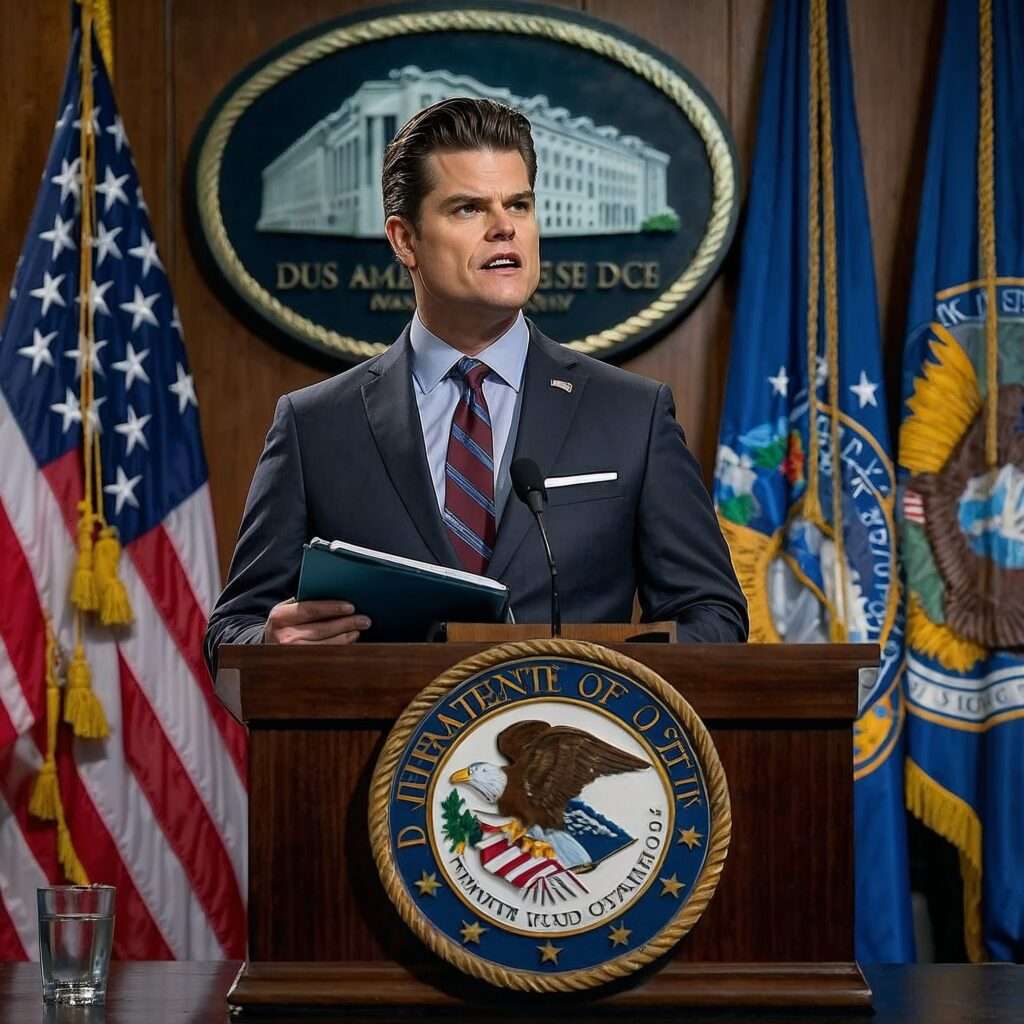
Matt Gaetz delivering a compelling argument in court as he prosecutes corruption, embodying his vision for justice and government accountability.
Matt Gaetz, widely known for his bold views on government accountability and law enforcement, represents an unconventional choice for the role of Attorney General (AG). His strong-willed personality and commitment to transparency challenge the traditional image of the AG, a position that demands impartiality and judicial restraint. While Gaetz’s nomination didn’t come to fruition, his outspoken nature and policy priorities spark questions about how he might have reshaped the Department of Justice (DOJ) or found a fitting role elsewhere within the organization.
This article evaluates Gaetz’s alignment with the responsibilities of the Attorney General, his potential impact, and the roles within the DOJ where his skills and approach might excel.
What Are the Core Responsibilities of the Attorney General?
The Attorney General is the top law enforcement official in the United States, tasked with maintaining public trust, enforcing federal law, and safeguarding national security. Below is a breakdown of the key responsibilities:
| Responsibility | Description |
|---|---|
| Enforcing Federal Laws and Protecting National Security | Ensures consistent enforcement of federal laws and combats organized crime, terrorism, and drug trafficking. Directs agencies like the FBI, DEA, and ATF to address domestic and international threats to U.S. security. |
| Supervising Federal Prosecutors and Law Enforcement Agencies | Oversees U.S. Attorneys and ensures DOJ initiatives align with administration priorities. Guides agencies like the FBI in managing high-stakes investigations. |
| Providing Legal Counsel to the President and Federal Agencies | Acts as the President’s chief legal advisor, interpreting federal laws and advising on legal matters, including constitutional challenges and enforcement policies. |
| Ensuring Accountability and Ethical Oversight | Enforces ethical standards within the DOJ and federal law enforcement agencies, investigating misconduct and preventing abuses of power. |
| Addressing Cybersecurity and Emerging Threats | Tackles modern threats such as cybercrime and domestic extremism. Coordinates nationwide efforts to protect critical infrastructure and mitigate threats. |
Why Matt Gaetz Could Have Been a Distinctive Attorney General
Matt Gaetz’s approach to governance, law enforcement, and transparency reflects certain qualities that align with the AG’s responsibilities. While unconventional, his leadership could have brought bold reforms to the DOJ.
1. Champion of Limited Government and Civil Liberties
Gaetz has long advocated for limiting federal overreach and protecting individual freedoms. His focus on decentralizing power aligns with the AG’s responsibility to balance federal authority with state sovereignty.
- Potential Impact: Gaetz could have championed reforms to curtail mass surveillance programs and strengthen privacy protections. By promoting federalism, he might have shifted DOJ policies to emphasize state and local autonomy over federal mandates.
2. Strong Focus on Law Enforcement and National Security
Gaetz’s law-and-order philosophy prioritizes national security and public safety. His emphasis on border security, anti-crime initiatives, and counter-terrorism aligns closely with the DOJ’s mission.
- Potential Impact: Under Gaetz’s leadership, the DOJ might have increased resources for federal agencies like the DEA and ATF to address border crime, human trafficking, and emerging national security threats.
3. Advocacy for Criminal Justice Reform
Gaetz’s willingness to address sentencing reform and improve prison conditions reflects a balanced approach to criminal justice. He has called for fairness in sentencing and policies that prioritize rehabilitation alongside accountability.
- Potential Impact: His leadership could have modernized the DOJ’s approach to criminal justice, emphasizing both enforcement and equitable reforms to address systemic issues in incarceration and rehabilitation.
4. Transparency and Accountability
Gaetz’s commitment to transparency in government aligns with the AG’s role in upholding ethical standards within federal agencies. He has often pushed for greater accountability in federal operations.
- Potential Impact: Gaetz could have implemented policies to increase transparency in DOJ investigations, fostering public trust in federal law enforcement.
5. Media Presence and Public Communication Skills
Gaetz’s media experience and ability to communicate effectively with the public could have been a valuable asset for the DOJ. The AG frequently addresses sensitive issues, and Gaetz’s confidence and clarity could make DOJ policies more accessible to the public.

Could Gaetz Excel in Another DOJ Role?
While Gaetz’s qualities might have made him a polarizing choice for Attorney General, his skills could align with alternative roles within the DOJ:
1. Assistant Attorney General for Civil Rights
Gaetz’s focus on balancing enforcement with individual liberties could suit a leadership role in the Civil Rights Division, addressing issues like surveillance reform and privacy protections.
2. Director of National Security Division
Given his emphasis on national security and law enforcement, Gaetz could lead the DOJ’s National Security Division, focusing on counter-terrorism, cyber threats, and international crime.
3. U.S. Solicitor General
Gaetz’s ability to articulate complex legal issues could make him an effective advocate for the federal government in cases before the Supreme Court.
Potential Challenges of Gaetz in DOJ Leadership
Despite his strengths, Gaetz’s candidacy for any DOJ leadership role comes with inherent challenges that could affect his effectiveness and the department’s public perception.
1. Politicization Concerns
Gaetz’s strong political identity and outspoken nature could overshadow the DOJ’s nonpartisan mission. Maintaining neutrality and impartiality is critical for DOJ leadership, and balancing these expectations with his partisan reputation would be difficult.
- Key Concern: Could Gaetz separate his political persona from the demands of a neutral and balanced leadership role?
2. Inexperience in Bureaucratic Leadership
While Gaetz’s legislative background provides insight into policymaking, managing the sprawling bureaucracy of the DOJ requires administrative expertise he has yet to demonstrate.
- Key Concern: Gaetz’s lack of experience in overseeing large-scale operations could hinder his ability to manage the DOJ effectively.
3. Public Perception and Controversy
Gaetz’s controversial reputation could polarize public opinion and create challenges in fostering trust and cooperation within the DOJ and beyond.
- Key Concern: Would Gaetz’s appointment further politicize the DOJ or erode public confidence in its impartiality?
Why Gaetz’s Strengths Might Fit Other DOJ Roles
While Matt Gaetz might not have been the ideal choice for Attorney General, his attributes could excel in other positions within the Department of Justice (DOJ). His bold approach and focus on government accountability align well with specialized roles that could leverage his strengths while minimizing his challenges.
1. Director of the Office of Civil Liberties
Gaetz’s commitment to privacy protections and his advocacy for limiting federal overreach make him a compelling candidate for leading a division focused on civil liberties. This position would allow Gaetz to oversee surveillance reforms, ensuring a balance between national security and individual freedoms.
- Potential Impact: Gaetz could champion policies to limit mass surveillance programs, promote data privacy, and advocate for the rights of citizens in the digital age.
2. Assistant Attorney General for Criminal Justice
Gaetz’s interest in criminal justice reform, including sentencing fairness and improved prison conditions, positions him to lead initiatives aimed at modernizing the justice system. This role would align with his calls for accountability while addressing systemic issues in incarceration and rehabilitation.
- Potential Impact: By focusing on sentencing reforms and rehabilitation programs, Gaetz could help create a more equitable justice system that prioritizes accountability and second chances.
3. Director of National Security Division
Given his strong stance on law enforcement and national security, Gaetz could effectively lead the National Security Division. This position involves addressing cyber threats, terrorism, and other national security challenges, areas where Gaetz’s priorities align.
- Potential Impact: Gaetz’s leadership could direct resources toward emerging threats like cyberattacks, while reinforcing counterterrorism efforts to protect U.S. interests.




Conclusion: Matt Gaetz’s Place in the DOJ
Matt Gaetz’s potential as Attorney General may have been divisive, but his focus on transparency, accountability, and government reform suggests he could excel in alternative DOJ roles. Positions like Director of the Office of Civil Liberties or Assistant Attorney General for Criminal Justice would allow him to channel his strengths effectively, tackling specific areas of reform without facing the full spectrum of challenges associated with leading the entire DOJ.
A Gaetz-led initiative within the DOJ could bring fresh perspectives, fostering innovation in federal law enforcement and criminal justice. However, his success would depend on his ability to temper his outspoken persona and prioritize the impartiality required for justice administration.
DARWIN’s Take
Matt Gaetz as Attorney General would have been a daring, controversial choice—one that challenged traditional norms of DOJ leadership. His commitment to transparency and government accountability could have sparked transformative change, but his brash style and polarizing image might have undermined the DOJ’s delicate balance between impartiality and public trust.
Would Gaetz’s bold ideas have revolutionized the DOJ or disrupted its foundations? His potential impact reflects a broader debate about what the justice system needs in an era of increasing skepticism: a reformer unafraid to shake things up, or a steady hand capable of navigating the complexities of neutrality. Either way, Gaetz’s presence in any DOJ role would force a reevaluation of how justice is upheld in modern America.
Sources
For further insights into Matt Gaetz’s potential role within the Department of Justice and the implications of his nomination, consider the following articles:
- “Matt Gaetz Withdraws as Attorney General Nominee”
- CBS News reports on Gaetz’s decision to withdraw from consideration for the Attorney General position, highlighting the controversies and challenges surrounding his nomination.
- Read more
- “Matt Gaetz’s Attorney General Nomination Faces Hurdles in Senate”
- The Hill discusses the skepticism among Senate Republicans regarding Gaetz’s nomination, citing concerns over his qualifications and ongoing investigations.
- Read more
- “Matt Gaetz Withdraws Attorney General Nomination”
- Washington Examiner provides an overview of Gaetz’s withdrawal from the nomination process, including reactions from political figures and implications for the DOJ.
- Read more
- “Matt Gaetz Withdraws From Attorney General Consideration Over Controversies”
- Vanity Fair explores the controversies leading to Gaetz’s withdrawal, analyzing the political and legal challenges he faced during the nomination process.
- Read more
- “Matt Gaetz AG Nomination: Timeline”
- ABC News provides a detailed timeline of events surrounding Gaetz’s nomination and withdrawal, offering context to the unfolding situation.
- Read more
These articles offer comprehensive perspectives on Matt Gaetz’s nomination for Attorney General, his subsequent withdrawal, and the broader implications for the Department of Justice.
Further Reading on Paranoid Prophet
Explore these in-depth articles on Paranoid Prophet for additional perspectives on government appointments, legal controversies, and political dynamics:
- Marco Rubio: A Poor Fit for Secretary of State
Discover why Marco Rubio’s hawkish foreign policy stance might misalign with the demands of U.S. diplomacy, potentially increasing global tensions. - Pete Hegseth as Secretary of Defense: A High-Risk Nomination
Analyze the implications of Pete Hegseth’s candidacy for Secretary of Defense, highlighting his alignment with Trump’s vision and the challenges of his lack of bureaucratic experience. - Trump’s Cabinet Picks and Their Controversies
Examine Trump’s second-term cabinet selections and their potential impact on policy direction, including a focus on controversial figures like Matt Gaetz. - Tulsi Gabbard as Director of National Intelligence: A Reformist Vision
Explore Tulsi Gabbard’s unique qualifications for DNI and the potential challenges of her independent leadership style in a highly politicized role. - Matt Gaetz’s Controversies and Career Trajectory
A deep dive into Matt Gaetz’s career controversies, examining how his legal troubles and outspoken personality have shaped his public image.
These articles provide a well-rounded look at the key players in U.S. politics and their potential impact on government and justice reform.
Frequently Asked Questions: Matt Gaetz as Attorney General
Q: Who is Matt Gaetz, and why was he considered for Attorney General?
A: Matt Gaetz is a U.S. Representative known for his strong advocacy for limited government, law enforcement, and transparency. His outspoken stance on accountability and reform sparked discussions about his potential suitability for leading the Department of Justice.
Q: What qualities would Matt Gaetz bring to the role of Attorney General?
A: Gaetz’s bold personality, focus on transparency, and advocacy for limited federal intervention align with efforts to increase government accountability. His communication skills and media presence could make DOJ initiatives more accessible to the public.
Q: Why might Matt Gaetz face challenges as Attorney General?
A: Gaetz’s controversial reputation and partisan identity could conflict with the DOJ’s requirement for neutrality. Additionally, his limited bureaucratic leadership experience raises questions about his ability to manage a complex institution like the DOJ.
Q: How does Matt Gaetz’s approach to law enforcement align with the DOJ’s mission?
A: Gaetz’s strong law-and-order stance aligns with the DOJ’s focus on combating crime and protecting national security. His interest in reforming sentencing and prison conditions suggests he could modernize aspects of criminal justice while upholding public safety.
Q: Could Matt Gaetz lead reforms in the Department of Justice?
A: Yes, Gaetz’s commitment to transparency and accountability positions him as a potential reformer. He could prioritize ethical oversight, improve government accountability, and address inefficiencies within federal law enforcement agencies.
Q: What alternative roles could Matt Gaetz take on in the DOJ?
A: Gaetz’s strengths could make him a good fit for roles like Director of the Office of Civil Liberties, Assistant Attorney General for Criminal Justice, or Director of the National Security Division, where his focus on privacy, reform, and security could shine.
Q: What is Matt Gaetz’s stance on criminal justice reform?
A: Gaetz has shown support for sentencing fairness, prison reform, and rehabilitation programs. As Attorney General, he could potentially balance accountability with more equitable and humane approaches to criminal justice.
Q: How might Matt Gaetz handle cybersecurity and domestic terrorism?
A: Gaetz’s focus on national security suggests he would prioritize countering cyber threats and extremism. He could strengthen DOJ initiatives to protect critical infrastructure and enhance domestic safety.
Q: How would Matt Gaetz’s controversial reputation impact his role at the DOJ?
A: While Gaetz’s outspoken nature might introduce fresh perspectives, it could also polarize public opinion and complicate bipartisan cooperation within the DOJ, potentially affecting the department’s neutrality and effectiveness.
Q: Could Matt Gaetz’s media presence benefit the DOJ?
A: Yes, Gaetz’s communication skills and media savvy could help the DOJ articulate complex policies and reforms to the public, fostering greater transparency and understanding of justice initiatives.


